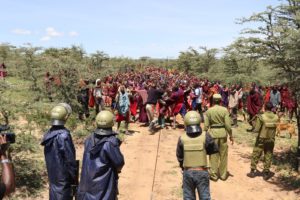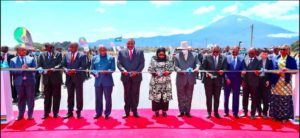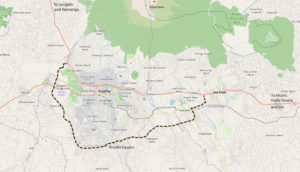by James L.Laizer
Relocation of people from Ngorongoro hits the headlines
The relocation of people from the famous Ngorongoro Conservation Area is continued to hit the headlines whereby a number of families reported to have registered for leaving to Msomera village in the Handeni District in Tanga.
According to The Citizen of 23rd July 2022, the Deputy Conservation Commissioner (DCC) of the Ngorongoro Conservation Area Authority (NCAA), Dr. Christopher Timbuka, reported that 757 households with 4,344 people have voluntarily signed for the relocation so far. “The number of households that are currently registering to relocate from Ngorongoro is huge and satisfying compared to our manpower. We have the funds, but cannot construct all required houses at once, that is why we are relocating people in phases and moving according to the budget.”
The indigenous Maasai community has lived in the Ngorongoro conservation area, a UNESCO World Heritage site in northern Tanzania, for over a century now. However, they now face being moved out, as the authorities contend that their growing population is a threat to wildlife habitat.
The registered Maasai families have to be moved to Msomera village, about 50km from Handeni township in Tanga region, 600km (370 miles) away from their ancestral land of Ngorongoro. The Arusha Regional Commissioner Hon. John Mongella was quoted as saying that the government has earmarked 400,000 acres of land for relocated Maasai households. In the video statement Hon. Mongela said that “There is no eviction here, all people who are leaving (are) voluntarily registered and the government is facilitating them.”
Although the Government officials are insisting that the relocation is voluntary, but the community remains sharply divided over the issue, with many reluctant to leave the only home they have ever known. The Maasai say the authorities are attempting to force them off their land in order to organise safaris and private hunting expeditions for tourists. The government however has rejected these accusations, but the issue has led to clashes between the pastoralists and police. One police officer was killed and several protesters were injured during demonstrations in Ngorongoro district’s Loliondo town.
Various local and international organisations have expressed their profound concern over ongoing efforts to relocate the Maasai from Ngorongoro. The United National Permanent Forum on Indigenous Issues called on the Government of Tanzania to immediately cease efforts to evict the Maasai people from the Ngorongoro Conservation Area as stated in the report of the 21st session in 2022 to be presented at UN Economic and Social Council (ECOSOC).
Further, the Forum called on the Government “to comply with the provisions recognised in the United Nations Declaration on the Rights of Indigenous Peoples, and other relevant international human rights instruments, and ensure the right of the Maasai to participate in decision-making, considering that [use of] their land in Loliondo for safari tourism, trophy hunting and “conservation” will affect their lives and territory.”
The Government issued a statement assuring the public and the international community that “the country abides by the rule of law and is a party to a number of international conventions and protocols with respect to human rights. Conservation is for the benefit of the people and in this regard the Government of the United Republic of Tanzania with continue to give priority to its people above anything else. … The exercise of implanting beacons around any protected area is a normal practice for all wildlife and forest protected areas in Tanzania and it is not strange for it to be applied to the Loliondo Game Controlled Area. The fact that the Government has decided to allocated the 2,500 square kilometres out of 4,000 square kilometres of protected land to the community testifies its commitment to its people and human rights plus community development activities as well. We therefore call upon the general public and the international community to ignore the ongoing propagated false allegations by some individuals and organisations that there is an eviction exercise and an infringement of human rights taking place in the Loliondo Game Controlled Area.”
A continuing dialogue between the government and the affected Maasai communities as well as adhering to the rights of the indigenous people is the best approach toward a fairly relocation process of the Maasai community in Ngorongoro. This would ensure the survival of the Maasai community, their ability to maintain livelihoods and fundamentally, their traditional way of life, whether in Loliondo or in Msomero.
Ten-year conservation plan launched
Tanzania launched an environmental conservation master plan as part of celebrations marking the World Environment Day. The master plan was launched by Prime Minister Kassim Majaliwa in the capital, Dodoma on Sunday 5th June 2022.
The government plans to take a number of measures to address the impact of environmental degradation caused by human activities. The Prime Minister directed the Ministry of Finance and Planning to allocate budget for its implementation in the next 10 years. The plan is aimed at reclaiming degraded areas in the country and at the same time controlling further environmental degradation, he added.
He urged government ministries and institutions, the private sector and individuals to fully participate in the implementation of the plan that he said focused on protection and conservation in 15 areas, including massive tree planting, controlling of invasive plants in protected areas, mobilization on the use of alternative energy to lessen dependence on firewood and charcoal, and controlling outbreaks of wildfires.
Other areas are protection of water sources, protection of animal corridors from encroachment by human activities, controlling of human-wildlife conflicts, and creation of a comprehensive waste management.
At the event, the United Nations resident coordinator in Tanzania, Mr Zlatan Milisic, commended the East African nation for efforts to conserve the environment in the face of climate change. “Tanzania has proved to be a trustworthy partner toward the conservation of the environment,” he said.
Mr Milisic also commended the government for mainstreaming the environment agenda into policies and decision-making as well as increasing engagement of the youth in the Environment Action Plan II. “Trees are now being planted and grown all over the country, including here in Dodoma where the Regional Commissioner is implementing the tree-planting campaign,” he said.
Speaking on behalf of Parliament’s Industry, Trade and Environment Committee, Mr Felix Kavejuru said nearly 500,000 trees were being felled annually, with 35% of them being cut down in Tabora, Shinyanga, Kigoma and central zone regions.
“The trend denies the country environmental products such as food, reliable water, drugs and clean air. The target of planting 1.5 million trees by each council annually should be emphasized. People should be educated on the need to shift to alternative energy and abandon firewood and charcoal,” he said.
World Environment Day, celebrated annually on June 5, is the United Nations’ principal vehicle for encouraging awareness and action for the protection of the environment. In Tanzania, the World Environmental Day has been a platform for raising awareness on environmental issues such as marine pollution, overpopulation, global warming, sustainable consumption and wildlife crime.
Tourists to enjoy high speed internet on Mount Kilimanjaro
Africa’s Tallest Mountain Mt- Kilimanjaro gets fast internet whereby the climbers now can upload their ascents to share with family, friends and followers in real time. The installation of the high-speed internet services on the slopes of Mount Kilimanjaro was implemented by a state-owned Service provider (Tanzania Telecommunications Corporation), whereby a broadband network set up at an altitude of 3,720 meters (12,200ft) above sea level at Horombo Huts. This is great news to tourists, tour guides as well as porters who previously, used to climb the Mount Kilimanjaro without the internet.
According to Nape Nnauye, Minister of Information, communication and ICT, the internet service will be extended to the summit of the mountain by the end of this year. The internet project would increase the visibility of the mountain and attract more visitors to one of the country’s leading tourist destinations where by tourists can now communicate worldwide from the summit of the mountain as well as improves the safety of mountain climbers and porters.




